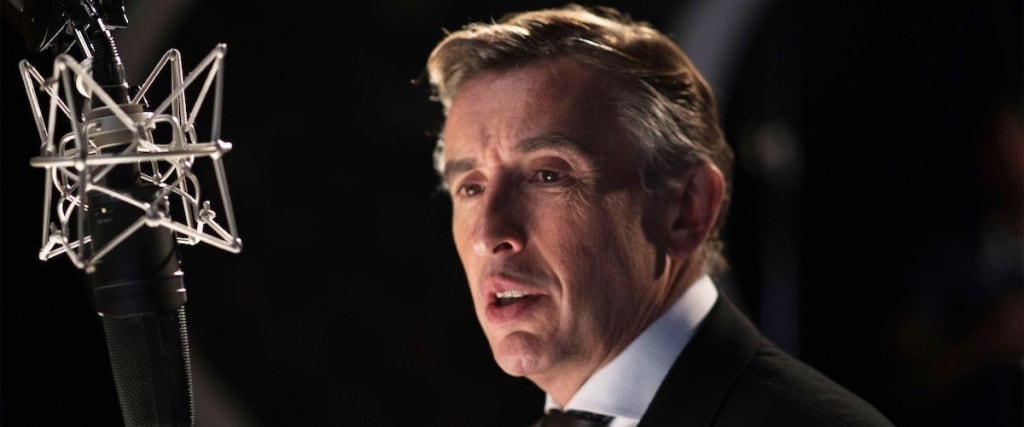Movie Review: 'Hot Air' Steve Coogan Suffers in Adam Sandler Leftover
Adam Sandler's favorite director shows he can fail with or without his usual star.

Hot Air is a lazy, pace-free, laugh free, comedy/drama that wastes the brilliant Steve Coogan in a role that he should have absolutely killed. I should not be surprised that a movie directed by Frank Coraci, Adam Sandler’s go to guy for dim-witted, unfunny tripe, would stink on ice and I am not surprised, not really. I am surprised however, that someone as ingenious and irrepressible as Steve Coogan would waste his time on something so toothless and creaky as Hot Air.
Hot Air stars Steve Coogan as blowhard, right wing, hypocrite, Lionel Macomb. Lionel is a right wing radio host in the Rush Limbaugh vein. He’s bombastic and rude and lives to insult people who disagree with him. If you think this is going to be a satire of his bad behavior or that this character is going to learn a valuable lesson in humility and respect for others, you’re right and you're wrong all at once. We will come back to this point later.
The plot of Hot Air kicks in when Lionel’s heretofore unknown niece, Tess (Escape Room star Taylor Russell), shows up at his posh New York City apartment and slips past security. Tess needs a place to stay while her mother, Laurie (Broadway actress Tina Benko), finishes rehab and while Tina is awaiting a placement at a private school. Lionel agrees to take Tess in but only on the insistence of his girlfriend, Valerie, played by the top-billed Neve Campbell, on complete auto-pilot in what barely amounts to more than a cameo.
Lionel is in trouble at work where his loudmouth antics are becoming stale. A younger and more calculated host and former protege, Gareth Whitley (Skyler Astin, in a wildly misconceived performance), has eclipsed Lionel’s ratings and is taunting him in the press. Lionel is also being challenged by a hard charging liberal Senator, played by Judith Light, whose immigration bill is one of Lionel’s favorite punching bags, though he refuses to engage the Senator directly, preferring cheap shots at her personal life and professional striving.
Again, you probably think Lionel is lining up for some kind of comeuppance. He’s rude, he’s cowardly, he cheats on his girlfriend and applauds the idea of immigrant children being booted out of the country over the perceived crimes of their parents. You think an epiphany is supposed to arrive but it never does. Instead, director Frank Coraci and first time screenwriter Will Reichel double down on the idea that we might somehow sympathize with Lionel because he had a rough childhood that informs his angry, bitter diatribes and mistrust of the rest of humanity.
No surprise, it’s a losing gambit. This is in part because Coraci’s direction is so clumsy and because the screenwriting keeps picking up and dropping threads throughout. For example, Tess’s first time meeting her uncle is seeing him boinking his maid. Then we are introduced to Neve Campbell’s character as this loving and benevolent woman, always understanding and deeply caring toward Lionel and his failings. Coogan and Campbell are given no chance to establish a believable dynamic. She’s saintly and obtuse and he’s pompous but affectionate. The thing about his cheating never comes up again, even during their inevitable separation from each other.
Other dropped plots include Lionel's professional rivalry with Skyler Astin's Gareth. We never find out what happens with the rivalry. The Astin character is used to set up the film's centerpiece monologue and then he's gone with no resolution. The character is barely more than functionary and Astin plays the character in a fashion that feels as if he's in the wrong movie. Astin is broad and silly, a caricature inside a movie that is far too busy pretending toward sincerity.
The familiar beats of a redemption arc are all there even as the character of Lionel as written, has no redeeming value aside from being played by Steve Coogan. We get a typically uninspired Frank Coraci comedy with overly familiar beats and failing attempts at pathos while the main character doesn’t change in any way. It’s almost as if this were a movie Adam Sandler turned down.
That is Sandler’s modus operandi after all. While a plot for a typical comedy unfolds he plays the unchanging center who, despite what should be life changing events, never actually changes in any way. He doesn’t learn lessons, he doesn’t become a better person, and he remains beloved by all around him despite his complete lack of redeeming qualities. There is even the way too attractive and far too forgiving love interest that Sandler favors in Neve Campbell.
Now, some who actually waste time seeing Hot Air will claim that Coogan’s Macomb does change at the end. He wants to listen to people now. Ah, but listen closer those who’ve wasted their money: the character wants what he wants, which is still part of the overall narcissism of the character. He’s not changing, he’s the same arrogant blowhard he was when the story started, with the same unearned sense of superiority, he just wants something he didn’t appear to want earlier in the movie.
This is also another example of the lazy screenwriting on display in Hot Air as the filmmakers try to pretend the character of Lionel is showing growth when he’s not and doing so in the literal final minutes of the movie, as if they needed to defend themselves against the exact criticism I am giving them. I can hear the filmmakers now ‘Aha, you say our character isn’t evolving, well he talked to his niece at the end of the movie like a human being, see: that’s growth.’
There are a number of examples of the laziness of this screenplay. Take for instance, the film’s big set piece. There is a monologue just after the midpoint of the movie and it’s likely the reason that someone as clever and talented as Steve Coogan decided to accept a movie like Hot Air. It’s a big, brash monologue about the death of the American dream that calls out the audience for our laziness and the cowardice of allowing people like Lionel to take advantage of us.
It’s the Howard Beale, Network monologue rejiggered for the iPhone era only sanctimonious, disingenuous and out of place in such a lightweight movie that is more interested in playing patty-cake between Liberals and Conservatives than actually saying something singular and relevant. Steve Coogan delivers the speech with gusto but you can sense about halfway through where he begins to realize that the rant isn’t going anywhere and the movie doesn’t have the heft to make the moment matter.
Instead of being a moment where the movie can state a thesis and stake a claim in the American zeitgeist, the moment is turned into a plot point. It’s the inciting incident that sets up the third act, which will separate Lionel, Tess, and Valerie before they can be brought back together by the forceful insistence of a screenwriter. You can almost see the light go out of Steve Coogan’s eyes as the rant is ending, as if he were realizing that his passion will go unrewarded in Hot Air.
I don’t recommend it, but Hot Air is available on most rental streaming services.
About the Creator
Sean Patrick
Hello, my name is Sean Patrick He/Him, and I am a film critic and podcast host for the I Hate Critics Movie Review Podcast I am a voting member of the Critics Choice Association, the group behind the annual Critics Choice Awards.






Comments
There are no comments for this story
Be the first to respond and start the conversation.